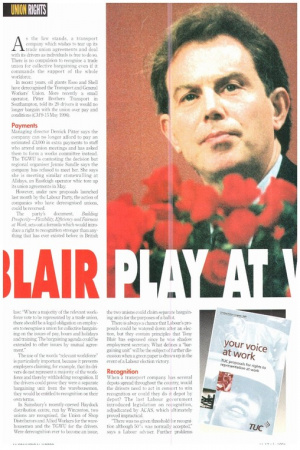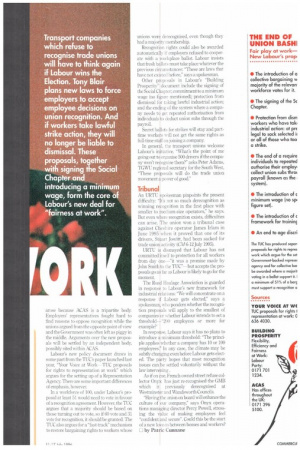A s the law stands, a transport company which wishes to
Page 56

Page 57

If you've noticed an error in this article please click here to report it so we can fix it.
tear up its trade union agreements and deal its drivers as individuals is free to do so. There is no compulsion to recognise a trade union for collective bargaining even if it commands the support of the whole workforce.
In recent years, oil giants Esso and Shell have derecognised the Transport and General Workers' Union. More recently a small operator. Fitter Brothers Transport in Southampton. told its 20 drivers it would no longer bargain with the union over pay and conditions K:319-15 May 1996.)
Payments
Managing director Derrick Pitter says the company can no longer afford to pay an estimated 0,000 in extra payments to staff who attend union meetings and has asked them to form a works committee instead. The TGWU is contesting the decision but regional organiser Jennie Sandle says the company has refused to meet her. She says she is meeting similar stonewalling at AlIdays, an EastUgh operator whic tore up its union agreements in May However, under new proposals launched last month by the Labour Party, the action of companies who have derecognised unions, could be reversed.
The party's document, Budding Prusperitr—Rexibifity. .k.fficienev and Fairness at Work, sets out a formula which would introduce a right to recognition stronger than anything that has ever existed before in British LAIR
law: "Where a majority of the relevant workforce vote to be represented by a trade union, there should be a legal obligation on employers to recognise a union for collective bargaining on the issues of pay, hours and holidays and training. The bargaining agenda could be extended to other issues by mutual agreement:' The use of the words 'relevant workforce." is particularly important, because it prevents employers claiming, for example. that its drivers do not represent a majority of the workforce and thereby withholding recognition. If the drivers could prove they were a separate bargaining unit from the warehousemen. they would be entitled to recognition on their own terms.
In Sainsbury's recently-opened Haydock distribution centre, run by Wincanton, two unions are recognised, the Union of Shop Distributors and Allied Workers for the warehousemen and the TGWU for the drivers. Were derec.ognition ever to become an issue, the two unions could claim separate bargaining units for the purposes of a ballot.
There is always a chance that Labour's proposals could be watered down after an election, but they contain principles that Tony Blair has espoused since he was shadow employment secretary. What defines a "bargaining unit" will be the subject of further discussion when a green paper is drawn up in the event of a Labour election victory.
Recognition
When a transport company has several depots spread throughout the countiy, would the drivers need to act in consort to win recognition or could they do it depot by depot? The last Labour government introduced legislation on recognition, adjudicated by ACAS, which ultimately proved impractical.
"There was no given threshold for recognition although 50°. was normally accepted," says a Labour adviser. Further problems arose because ACAS is a tripartite body Employers' representatives fought hard to find reasons to oppose recognition while the unions argued from the opposite point of view and the Government was often left as piggy in the middle. Arguments over the new proposals will be settled by an independent body possibly sited within ACAS.
Labour's new policy document draws in some part from the TUC's paper launched last year, "Your Voice at Work TUC proposals for rights to representation at work" which argues for the setting up of a Representation Agency There are some important differences of emphasis, however.
In a workforce of 100, under Labour's proposal at least 51 would need to vote in favour of a recognition agreement. However, the TUC argues that a majority should be based on those turning out to vote, so if 60 vote and 31 vote for recognition, it should be granted. The TUC also argues for a "fast-track" mechanism to restore bargaining rights to workers whose unions were derecognised, even though they had a majority membership.
Recognition rights could also be awarded automatically if employers refused to cooperate with a workplace ballot. Labour insists that fresh ballot s must take place whatever the previous circumstances: "These are laws that have not existixl before," says a spokesman.
Other prop' sals in Labour's "Building Prosperity" dixianent include the signing of the Social Chapter; commitment to a minimum wage (no figure mentioned): protection from dismissal for taking lawful industrial action; and the ending of the system where a company needs to get repeated authorisation from individuals to deduct union subs through the payroll.
Secret ballots for strikes will stay and parttime workers will not get the same rights as full-time staff on joining a company In general, the transport unions welcome Labour's initiative. "What's the point of me going out to organise 500 drivers if the company won't retognise them?" asks Peter Adams, T(;WL: regional secretary for the South West, "These proposals will do the trade union movement a power of good."
Tribunal
An URTU Spokesman pinpoints the present difficulty: "It's not so much derecognition as winning recognition in the first place with smaller to medium-size operators," he says. But even Mierr recognition exists, difficulties can arise. The union won a tribunal case against Cheshire operator James Irlam in June 1995 when it proved that one of its drivers. Stuart Jowitt, had been sacked for trade union activity (CM 6-12 July 1995).
URIC is dismayed that Labour has not committed itself to protection for all workers from day one–"it was a promise made by John Smith to the TUC"—but accepts the proposals go as far as Labour is likely to go for the moment.
The Road I laulage Association is guarded in response to Labour's new framework for industrial relations: "We will concentrate on a response if Labour gets elected," says a spokesman, wl ic>ponders whether the recognition proposals will apply to the smallest of companies or whether Labour intends to set a threshold—"2111) employees or more for example?'
In response, Labour says it has no plans to introduce a minimum threshold: "The principle applies whether a company has 10 or 100 employees." In any case, the climate may be subtly changing even before Labour gets elected. The party hopes that most recognition issues can be settled voluntarily withmt the law intervening, As if on cue, French-owned street refuse collector Onyx has just re-recognised the GMB which it previously &recognised at Westminster and Wandsworth Councils.
"Having the union on board will enhance the culture of our company" says Onyx operations managing director Percy Powell, stressing the value of making employees feel "confident and secure". Could this be the start of a new loVein between bosses and workers? U by Patric Cunnane




























































































































